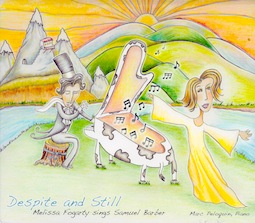
How wonderful it is to again make Samuel Barber’s acquaintance. Despite his fame, due in large part to his unforgettable Adagio for Strings, Knoxville: Summer of 1915, and the opera Vanessa, precious few recordings are devoted solely to all or part of his 47 songs for voice and piano (and, in the case of Dover Beach, Op. 3, for string quartet).
All the more reason, then, to cheer soprano Melissa Fogarty’s just released CD of 23 of Barber’s songs. Produced in part by the New York–based soprano herself and her partner, Jennifer Griesbach, the nicely recorded disc receives attentive accompaniment from pianist Marc Peloquin.
Given that Fogarty has become a favored soprano of composer David del Tredici, whose writing for high-flying soprano often approaches the torturous, the technical surety and ease that she brings to Barber’s music comes as no surprise. Nuvoletta, Op. 25, a fabulous romp of a song, shows off her quasi-soubrettish timbre to perfection. Although her pace is over a minute slower than Leontyne Price’s rendition with Barber during their famed 1953 concert at the Library of Congress, the song bubbles along with carefree delight. Fogarty’s enunciation of James Joyce’s text from Finnegan’s Wake is also exemplary.
Listen To The Music
Nuvoletta, Op 25Despite And Still, Op. 41: Solitary Hotel
Texts for Fogarty’s CD are only available online. Their comprehension is crucial. Despite and Still, for example, sets poetry by Robert Graves, Theodore Roethke, and Joyce (a favorite of Barber’s). Barber’s attention to the deeper meaning of words, and to their natural cadence, shows him to be one of the finest 20th-century American art song composers.
Because I find scrolling through online texts less comfortable than sitting with printed words in hand, I called into play texts that come with the Price/Barber disc and the 1991 complete set of Barber songs with soprano Cheryl Studer, baritone Thomas Hampson, and a pianist long associated with Barber, John Browning. This made further comparisons inevitable.
Major portions of Fogarty and Peloquin’s recital are devoted to Barber’s 10 Hermit Songs, Op. 29, which Price and Barber debuted in 1953, and the five songs of the late-career opus, Despite and Still, Op. 41. The lighter of the Hermit Songs — notably the delightful song “The Monk and His Cat” (“Pangur, white Pangur, how happy we are / Alone together, Scholar and cat”) — are treated with an innocent sweetness that Studer misses. If Fogarty can’t bring Price’s Southern languor to this gem, or her predecessors’ weight of tone and wide dynamic modulations to the graver songs, she nonetheless deepens her sound to a most satisfying extent.
As well as Fogarty sings “Solitary Hotel” from Despite and Still, the then-36-year-old Thomas Hampson artfully — perhaps too artfully — uses pauses to further underscore Joyce’s and Barber’s intentions. Browning also employs far more dynamic contrast to bring the singer’s artistry home, and is more resonantly recorded.
No one else can equal Melissa Fogarty’s joy and carefree abandon. Her lack of self-conscious artifice and her love of Barber’s songs shine throughout this wonderful recital.

